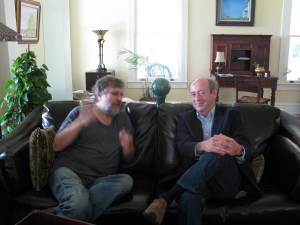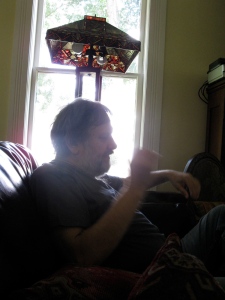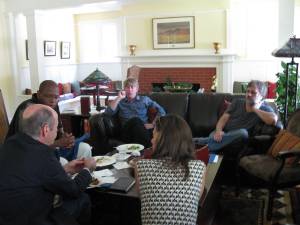
Man at the Café by Juan Gris
Rollins College
Religion Senior Seminar: REL 490
Spring 2010
Weds 4 to 6:30pm, ORL 215
Office Hours: 8.30-9.30 & 11-12 M&W
Seminar Title:
Religion Senior Seminar
Postmodernism: System. . . Structure . . . Difference . . . Truth
Dr. Creston Davis
Email: Creston.Davis@gmail.com
Teaching Assistant: Megan Flocken
Thursdays, 5:30-6:30pm, Olin library pillow room (crowd permitting)
Fridays, 1-2pm, French House patio (weather permitting)
meganflocken@gmail.com
407.353.6329
*This seminar begins with the high-water mark of modern “critical” philosophy, which is constituted in the Post-Enlightenment trend called “Romanticism” and especially in the thought of Hegel, seen most vividly in his interpretations and responses to Kant’s and Fichte’s transcendental grounding of the subject/Ego. Above all it is Hegel who gives us a sustained critique of “critical” philosophy that culminates in the thought of Kierkegaard whose version of “repetition” gives birth to a seminal logic found within the post-modern philosophical outlook. The seminar then takes us through the “Heideggerian” turn framed by Western philosophy’s forgetfulness about the very question of Being and then into the heart of postmodern philosophy (Derrida) and out the other side (in the thought of Badiou, Derrida’s student, Malabou and Zizek). So, if you like, we move from modern philosophy, to postmodern philosophy, and into a moment that I call a “post-secular” horizon in which the question of Being and theology has returned to the centerpiece within the tradition of Continental philosophy.

Mark Tansey "Derrida Queries de Man"
Some of the questions this seminar will address include: How can we pass beyond absolute Knowledge? (this is the question Mark C. Taylor poses). How can we approach that which marks the closure of a system of thought that needs nothing but its own system to subsist? If modernism is, as Alain Badiou asserts, a system of our “accepted facts” of a world articulated by “the great constructions of the 19th Century to which we remain captive—the idea of the historical subject, the idea of progress, the idea of revolution, the idea of humanity and the ideal of science,” then what comes after modernity? What, in other words, is the “logic of thinking, critique, and existence” in the wake of the collapse of the great “metanarratives” of history? In short: What becomes of philosophy and theology after the fall of the project we call modernity?
Is there hope for thinking (for the production of thought) after the failure of modern philosophy seen at its zenith when “Kant’s efforts to unearth the conditions of the possibility of knowledge actually births the conditions of the impossibility of knowledge precisely because the a priori categories of understanding forever sunder thought from the thing-in-itself (ding an sich)?” (Tayor) This very epistemological move (a move that requires the subject to “step-back” from the objects) necessarily articulates a split between subject and object, between the “external world” and our mind that thinks the objects in the world). In the heart of epistemology the world is thus alienated from the thinking subject, because the question of the certitude of the ideas of the external objects in the mind actually representing those objects in the external world cannot be established. Hence, the subject and the object are sundered into an irreconcilable relation (i.e., a relation premised on non-relation). The Critique of Pure Reason ends by confirming an unbridgeable gap between subject and object, which again undermines the very possibility of knowledge in the first place. In other words, Hegel’s project begins by trying to address this “gap” set between the world “out there” and our ideas that think “the world” in our mind.

The New Man by El Lissitzky
Enter Hegel! For Hegel the impasse of Kant’s critical philosophy can be transcended only by giving, as Mark C. Taylor argues “speculative expression to Kant’s aesthetic idea, and secondly, by establishing the actuality of this speculative idea uncovered in its concrete embodiment in both nature and history.” So “Hegel reformulates Kant’s definition of poetic Geist, by defining spirit as that which relates itself to itself and is determinate, is other-being and being-for-self, and in this determinateness, or in its self-externality, abides within itself; in other words, it is in and for itself” (Taylor). So Hegel solves Kant’s epistemological problematic but at the cost of turning the world’s Geist into a totalizing system in which difference is neutralized into the background of the Whole; difference and otherness are sacrificed to the god of History—The Absolute! (or at least this is one well known way of situating Hegel’s system–a way that I challenge in my forthcoming book on Hegel (that Clayton Crockett, Slavoj Zizek and I edit) coming out with Columbia University Press later this year).
The thoroughgoing critique of Hegel’s “totalizing-system” was launched by Soren Kierkegaard and in doing so establishes many seminal pillars of what will become known as postmodernism in the 20th century. For Kierkegaard what is forever missing in Hegel’s system is the individual who emerges within the throes of temporality and becoming which always resists the closure that absolute knowledge exerts upon it. Thus, “truth for Kierkegaard is an irreducible process; one that is lived as a struggle against the closure of the absolute knowledge in the fabric of time. This is because he regards “reality” as “an inter-esse between the moments of the hypothetical unity of thought and being that abstract thought presupposes.” So, in the final analysis, truth for Kierkegaard is “inaccessible and unachievable”—a motif that confronts his readers clearly in his seminal text, Repetition. (cf. Taylor’s Introduction for more about Kierkegaard vis-a-vis Hegel).

After closely reading Hegel and Kierkegaard the class will turn toward the 20th Century. The dominant philosopher in the 20th century is none other than Martin Heidegger. For Heidegger philosophy has come to its terminus—we must now think after metaphysics. But this is not a sad moment for philosophy; indeed it forces us to think the “unthought” within philosophy. Heidegger’s entire project is predicated on the question of what philosophy has not-thought! We know what philosophy has thought but this thinking for Heidegger is conditioned by the subject wedded to the Cartesian cogito that ends by burning down the house of metaphysics. What becomes interesting for Heidegger, what philosophy has forgotten, is the very question of Being as Being. Not being as constituted by the parameters of the human subject thinking “Being” but thinking Being external to the subject thinking it. In other words, for Heidegger philosophy must think difference—“the difference between Being and beings” (between Being (as pure presence) and objects that indwell in Being). For Heidegger’s question (combined with Kierkegaard) opens up a new space within which philosophy attempts to account for “otherness” beyond the Hegelian “totality” or the “Absolute.” This brings us right into the heart of Jacques Derrida’s idea of la differance and deconstruction, and second, engages Alain Badiou’s idea of the Truth-Event (inspired by his two teachers, John Paul Sartre and Louis Althusser, both of whom were introduced to Hegel through A. Kojeve’s lectures). For the former, the idea of deconstruction is understood as a “critical rereading of all Western philosophy in which Derrida tries to dismantle (the) tradition, as if from within, by tracing philosophy’s other,” as Taylor argues. Siding with Kierkegaard and Heidegger, (early to middle) Derrida unleashes an all out attack on Hegel’s totalizing structure by attempting to think difference as difference and other qua other. “This difference, irreducible to identity—this other, irreducible to same, is an alterity that ‘exceeds the alternative of presence (pure Being) and absence (concealment)’.” Finally, we will observe how, Alain Badiou and Slavoj Zizek attempt to save “truth” from both postmodern and modern philosophy (of both Derrida and Lyotard as well as Gadamer and Heidegger) by re-reading Hegel’s idea of “the negation of negation” along side of his “atheistic” retrieval of St. Paul’s idea of “Event” as a way to re-claim philosophy’s original desire, namely the quest for truth in being-in-the-world.

Rene Magritte
Thus, in a sentence (kind of?): This seminar seeks to trace out Kant’s problematic inextricably bound up in Critical Philosophy, how Hegel attempts to resolve this dualism in terms of a “system” of history and science, which Kierkegaard both agrees and disagrees with, as Heidegger recapitulates the entire tradition of philosophy by thinking difference as such, which inspires Derrida, Badiou and Zizek’s “the Parallax View.”
*My short narrative (a story that we will more or less be following and challenging throughout the seminar) is partly indebted to the work of my friend, Mark C Taylor (professor at Columbia University). See especially his Introduction: “System . . . Structure . . . Difference . . . Other” in his edited book Deconstruction in Context: Literature and Philosophy, Chicago University Press, 1986).

Oedipus Rex by Max Ernst
Required Books:
G.W.F. Hegel, Early Theological Writings, intro by Richard Kroner, trans. TM Knox, University of Chicago Press, 1975.
G.W.F. Hegel, The Phenomenology of Spirit, forward by JN Findlay, trans. AV Miller, Oxford University Press, 1977.
Soren Kierkegaard, Fear and Trembling/Repetition, trans. Edna and Howard Hong, Kierkgaard’s Writings Vol. 6, Princeton University Press, 1983.
Jacques Derrida, The Gift of Death, trans. Davis Wills, University of Chicago Press, 1992.
Alain Badiou, Saint Paul: Foundation of Universalism, trans. Ray Brassier, Stanford University Press, 2003.
Additional Texts (selections provided in class):
Slavoj Zizek and John Milbank, ed. by Creston Davis, The Monstrosity of Christ: Paradox or Dialectic, MIT Press, 2009.
Creston Davis, Slavoj Zizek, and John Milbank, Paul’s New Moment: Continental Philosophy and the Future of Christian Theology, Baker Academic, 2010 (forthcoming).
Catherine Malabou, Plasticity at the Dusk of Writing: Dialectic, Destruction, Deconstruction, trans. Carolyn Shread, Columbia University Press, 2009.
Martin Heidegger, Being and Time New York, NY: Harper & Row, 1962
GRADE
There will be three graded aspects of this seminar. First there will be your final research paper. Your twelve-page paper will be on a topic approved by me no later than the ides of March (i.e., 15th). This paper will comprise 50% of your final grade. The second aspect will require you to both present and respond in the seminar. These are official—formal requirements that require you to accomplish quality work. When you present you will be required to write out your presentation in a three-page paper and get it to the respondent one-week prior to your scheduled presentation in the seminar. The respondent will then have until Sunday at midnight to email his/her two-page response to everyone in the class. The presenter, too, will have to email his/her presentation to everyone in the class by Sunday night midnight. In this way, everyone will have to read the original assigned text, the presenter’s paper, and the respondent’s paper. This part of the grade will comprise 30% (15% for your presentation paper & 15% for your response paper). The third and final graded task will be to post weekly responses to the assigned texts on Blackboard by no later than Wednesday at 3pm. This part of the course will comprise 20% of your grade. You will be required to posit ten (10) posts responding to the assigned reading by the end of the term. Failure to post all ten responses will severely compromise your grade, i.e., the highest grade you can receive in the seminar will be a C. Note: the presenter and the respondent do not have to post their responses on Blackboard the week that they are presenting/responding.
SCHEDULE
#1 January 13 – Hegel: Early Theological Writings
#2 January 20 – Hegel: Early Theological Writings
#3 January 27 – Hegel: The Phenomenology of the Spirit, A. Consciousness, & B. Self-Consciousness
#4 February 3 – Hegel: The Phenomenology of the Spirit, Reason
#5 February 10 – Hegel: The Phenomenology of Spirit, Spirit
#6 February 17 – Hegel: The Phenomenology of Spirit, Religion & Absolute Knowledge
#7 February 24 – Hegel: The Phenomenology of Spirit, Preface
#8 March 3 – Kierkegaard: Fear and Trembling
SPRING BREAK
#9 March 17 – Heidegger: Introduction to Being and Time (provided)
#10 March 24 – Derrida: The Gift of Death (Chapters I & II)
#11 March 31 – Derrida: The Gift of Death (Chapters III & IV)
#12 April 7 – Badiou: Saint Paul: Foundation of Universalism (Prologue and Chapters I-5)
#13 April 14 – Badiou: Saint Paul: Foundation of Universalism (Chapters VI-XI)
#14 April 21 – Malabou; Davis, Milbank, Zizek (selections from the forthcoming book Paul’s New Moment: Continental Philosophy and the Future of Christian Theology forthcoming with Baker Academic).


















 In this fashion, the profound thrust of the Pauline legacy is not so much a question of the undoing of ethnic law that leads to the introduction to a new revolutionary order of Love, as it was in Badiou. Rather the profundity of the Pauline legacy, Agamben suggests, is to proclaim a deadlock or suspension of the dialectic between law and guilt that renders the dialectic inoperative.
In this fashion, the profound thrust of the Pauline legacy is not so much a question of the undoing of ethnic law that leads to the introduction to a new revolutionary order of Love, as it was in Badiou. Rather the profundity of the Pauline legacy, Agamben suggests, is to proclaim a deadlock or suspension of the dialectic between law and guilt that renders the dialectic inoperative.











